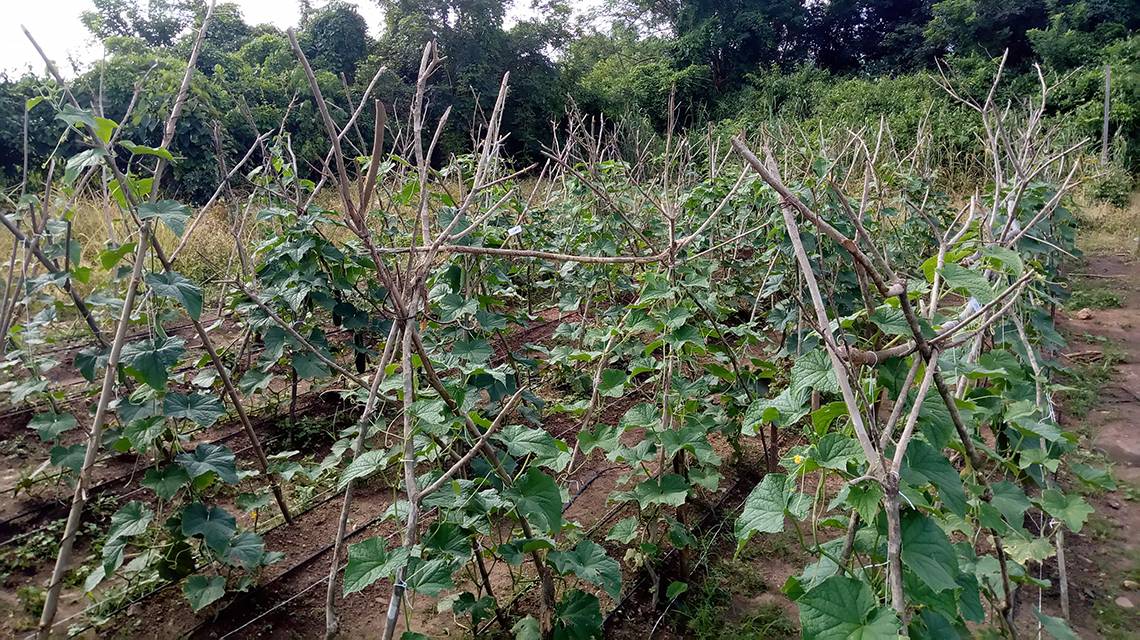Fleeing from terrorists and sheltering in makeshift camps for the internally displaced is a reality for many in Nigeria. During this time of hardship, farming is a source of solace and income for some. Liayatu Ayuba, a farmer who fled from Boko Haram, a terrorist group in West Africa, now lives in a camp for internally displaced people, or IDPs, in Nigeria's capital, Abuja. She is one of over 2,500 people in the Abuja camp who has received training and equipment to set up small-scale drip irrigation systems (see The Science) for growing food since 2018.
"Being trained on this new agricultural technology and putting it into practice gives us a little bit of our lives back," said Ayuba.
The assistance is part of a technical cooperation project by the IAEA, in collaboration with the Food and Agriculture Organization of the United Nations (FAO) and the Federal University of Oye Ekiti. Using nuclear technology, the IAEA - in partnership with the FAO - has developed techniques for cultivating crops with minimal water use under an approach that is called climate-smart agriculture. This has benefitted farmers in many countries. In the Abuja camp, the new irrigation systems have helped increase yields of crops such as cucumber, watermelon and okra by 60%, while decreasing water use by 45% compared to other methods.
"Growing and selling these crops gives us an income, and we are working towards improving the lives of many in the camps by providing food," Ayuba said. More than 80% of the camp's inhabitants are women and children.
Ayuba's situation is not uncommon in Nigeria. Over 2.7 million people have been displaced in the country since 2014 due to Boko Haram, according to the United Nations' refugee agency, UNHCR. The group has used extreme forms of violence to threaten villages across Nigeria, forcing people from their homes and livelihoods.
Many of the people end up in IDP camps, which are often overcrowded and have food shortages. They comprise makeshift tents and shelters built out of plastic and metal sheets, which offer little relief from the baking sun and the heat of the tropical climate.
Many camps are located in areas with harsh climate conditions, such as minimal rainfall, drought, and high temperatures, making it difficult to grow food. This is only being exacerbated by climate change.
Following the success of the small-scale drip irrigation systems in Abuja, the Federal University of Oye Ekiti has partnered with a local non-governmental organization, Akabat Ventures, to expand the use of drip irrigation technology to more camps throughout the country, in part through funding from the national Tertiary Education Tax Fund.
"Through training and support, the farmers - mostly women - can really make a difference by not only providing food for themselves, but creating a business providing food for others at the camps as well. This has real long-term impact on the lives of people," said Thuloane Tsehlo, the IAEA Programme Management Officer leading the project.
Working together since 2012
Scientists in Nigeria have been working with the IAEA and the FAO since 2012 to help farmers use drip irrigation systems to grow food despite harsh climate conditions and their changing life circumstances. The assistance began with training 60 national agricultural experts, providing expert advice as well as laboratory and field equipment.
The national experts have since been training students at the Federal University Oye Ekiti on how to use the drip irrigation technology, including how to optimize fertilizer and water use for crops. This training involves monitoring soil moisture and the amount of fertilizer needed by tracking isotopes (see The Science). The measurements and information they collect are then transferred to the farmers to ensure they have real-time data for optimizing water use for growing crops. They have trained 684 students so far.
"The training that takes place with the students and farmers is what leads to the impact," said Lee Heng, Head of the Soil and Water Management and Crop Nutrition Section at the Joint FAO/IAEA Division of Nuclear Techniques in Agriculture. "By training people on the ground, this technology can be used for generations and represents a successful move towards improved food security in the country, and for the most vulnerable in IDP camps, with the use of sustainable farming techniques adapted to a changing climate."

Over the past eight years, drip irrigation systems have been implemented, ensuring crops are able to grow in the harsh climate. This nuclear technology along with training for students and farmers is being expanded to include more IDP camps across the country. (Photo: Fasina Abayomi)






